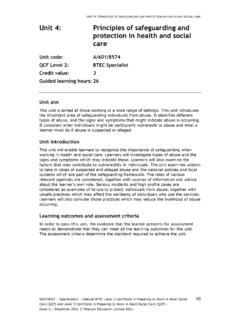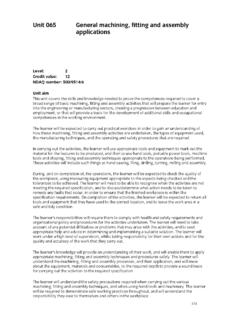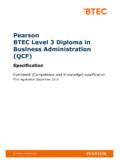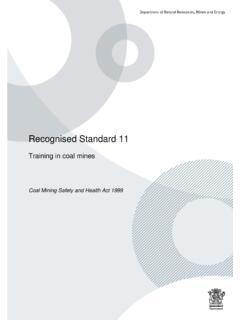Transcription of Unit 14: Understanding the principles and practices of ...
1 BA026798 Specification Edexcel Level 3 and 4 Awards, Certificate and Diploma in Learning and Development (QCF) Issue 1 September 2011 Pearson Education Limited 111 Unit 14: Understanding the principles and practices of assessment Unit reference number: D/601/5313 QCF level: 3 Credit value: 3 Guided learning hours: 24 Unit summary The aim of this unit is to assess a learning and development practitioner s knowledge and Understanding of the principles and practices of assessment. Practitioner means anyone with a learning and development responsibility as the whole or a part of their role. Evidence requirements This unit must be must be assessed using methods appropriate to the assessment of knowledge and Understanding . There is no requirement for each unit to be assessed separately. Assessors are advised to adopt a holistic approach and, where possible, to use one activity as evidence for learning outcomes and assessment criteria for two or more units.
2 There must be valid, authentic and sufficient evidence for all the assessment criteria. Holistic assessment is encouraged and one piece of evidence may be used to meet the requirements of more than one learning outcome or assessment criterion. Assessment methodology This unit is assessed in the workplace or in conditions resembling the workplace. BA026798 Specification Edexcel Level 3 and 4 Awards, Certificate and Diploma in Learning and Development (QCF) Issue 1 September 2011 Pearson Education Limited 112 Learning outcomes and assessment criteria Learners can enter the types of evidence they are presenting for assessment and the submission date against each assessment criterion. Alternatively, centre documentation should be used to record this information. Learning outcomes Assessment criteria Evidence type Portfolio reference Date 1 Understand the principles and requirements of assessment Explain the functions of assessment in learning and development Define the key concepts and principles of assessment Explain the responsibilities of the assessor Identify the regulations and requirements relevant to assessment in own area of practice.
3 2 Understand different types of assessment method Compare the strengths and limitations of a range of assessment methods with reference to the needs of individual learners. 3 Understand how to plan assessment Summarise key factors to consider when planning assessment Evaluate the benefits of using a holistic approach to assessment Explain how to plan a holistic approach to assessment Summarise the types of risks that may be involved in assessment in own area of responsibility Explain how to minimise risks through the planning process. BA026798 Specification Edexcel Level 3 and 4 Awards, Certificate and Diploma in Learning and Development (QCF) Issue 1 September 2011 Pearson Education Limited 113 Learning outcomes Assessment criteria Evidence type Portfolio reference Date 4 Understand how to involve learners and others in assessment Explain the importance of involving the learner and others in the assessment process Summarise types of information that should be made available to learners and others involved in the assessment process Explain how peer and self-assessment can be used effectively to promote learner involvement and personal responsibility in the assessment of learning Explain how assessment arrangements can be adapted to meet the needs of individual learners.
4 5 Understand how to make assessment decisions Explain how to judge whether evidence is: sufficient authentic current. Explain how to ensure that assessment decisions are: made against specified criteria valid reliable fair. BA026798 Specification Edexcel Level 3 and 4 Awards, Certificate and Diploma in Learning and Development (QCF) Issue 1 September 2011 Pearson Education Limited 114 Learning outcomes Assessment criteria Evidence type Portfolio reference Date 6 Understand quality assurance of the assessment process Evaluate the importance of quality assurance in the assessment process Summarise quality assurance and standardisation procedures in own area of practice Summarise the procedures to follow when there are disputes concerning assessment in own area of practice.
5 7 Understand how to manage information relating to assessment Explain the importance of following procedures for the management of information relating to assessment Explain how feedback and questioning contribute to the assessment process. 8 Understand the legal and good practice requirements in relation to assessment Explain legal issues, policies and procedures relevant to assessment, including those for confidentiality, health, safety and welfare Explain the contribution that technology can make to the assessment process Evaluate requirements for equality and diversity and, where appropriate, bilingualism in relation to assessment Explain the value of reflective practice and continuing professional development in the assessment process. BA026798 Specification Edexcel Level 3 and 4 Awards, Certificate and Diploma in Learning and Development (QCF) Issue 1 September 2011 Pearson Education Limited 115 Learner name: _____ Date:_____ Learner signature: _____ Date:_____ assessor signature: _____ Date:_____ Internal verifier signature: _____ (if sampled) Date:_____ BA026798 Specification Edexcel Level 3 and 4 Awards, Certificate and Diploma in Learning and Development (QCF) Issue 1 September 2011 Pearson Education Limited 116 Unit content 1 Understand the principles and requirements of assessment Functions of assessment in learning and development.
6 Functions eg measurement and recording of achievement, identification of individual learners needs, formative or summative assessment, fit for purpose, assessment against standards and performance/assessment criteria, monitoring development, evidence for performance review/targets/benchmarking, contributing to quality assurance, development of best practice Key concepts and principles of assessment: purpose eg who is it for? learner, trainer, assessor , organisation, employer; assessment as a part of the learning or training cycle eg to recognise prior learning, to identify specific assessment requirements; assessment of specific learning domains eg Bandler and Grinder s psychomotor/cognitive/affective skills, knowledge or Understanding Responsibilities of the assessor : range of responsibilities eg to the learner, the employer, the organisation, occupational standards, awarding organisation; practical responsibilities eg planning, managing and delivering assessment; maintaining the integrity of the qualification; learner-centred assessment Regulations and requirements relevant to assessment: regulatory bodies of standards eg Ofqual, Sector Skills Councils, awarding organisations, Institute for Learning.
7 Other regulations eg health and safety, equality and diversity/ disability act, data protection, safeguarding learners during assessment; recording/tracking and logging assessment decisions, communication decisions with learners, standardisation, moderation and quality assurance of assessment 2 Understand different types of assessment method Strengths and limitations of assessment methods in relation to the needs of individual learners: range of assessment methods for performance-based assessment of skills or knowledge-based assessment of Understanding , individual or group assessment; fit for purpose eg learner needs, context; measures of achievement eg performance criteria, assessment criteria, levels standards; practical limitations eg numbers involved, range, opportunity, reliability, time constraints, resources, staffing 3 Understand how to plan assessment Key factors in planning assessment: formal eg addressing regulations or standards, learner, employer, business needs; timing of assessment eg initial/pre-course, formative, summative, recognising prior learning; range of methods/activities to meet learner needs eg observation, performance evidence, discussion, witness/learner statement, tests, multiple-choice questions, written activity, reflective journal, verbal questioning; naturally occurring evidence.
8 Specific needs BA026798 Specification Edexcel Level 3 and 4 Awards, Certificate and Diploma in Learning and Development (QCF) Issue 1 September 2011 Pearson Education Limited 117 Holistic approach to assessment: benefits eg cost and time effectiveness, motivational for learners eg promoting learner responsibility and learner involvement, use of naturally occurring evidence, experiential learning, linking different aspects of learning through assessment, transference of skills, workbased opportunities, rationalising collection of assessment evidence, meeting number of learning outcomes/assessment criteria, linked knowledge-based and performance-based assessment opportunities Planning a holistic approach to assessment: range of assessment requirements and opportunities eg comprehensive approach, logical progression and sequencing, related to specific context, learner needs, preferences, workplace; opportunities to use linkages particularly between knowledge and Understanding to skills requirements, naturally occurring evidence, appropriate assessment opportunities, evidence appropriate to number of learning outcomes/assessment criteria Risks involved in assessment: organisational risks eg organisational culture, appropriate opportunities for assessment, staff occupational or assessment experience; practical risks eg health and safety, equality and diversity, data protection, specific occupational risks; learner-based risks eg occupational competence, responsibility, motivation.
9 Assessment risks eg timing, range, sufficiency, bias, fairness Minimising risks through planning the assessment process: clear criteria for assessment eg identifying, addressing specific requirements, standardisation of planning, negotiating with learner; selecting appropriate range of assessment methods appropriate to context to generate the required evidence; safeguarding learners eg planning for health and safety, equality and diversity, negotiating with learners, appropriate timing of assessment; clear recording, tracking, logging of assessment decisions 4 Understand how to involve learners and others in assessment Importance of involving the learner and others in the assessment process: recognising needs eg initial assessment, learning, training needs analysis, recognising current level of knowledge, Understanding , skills and experiences; negotiating learning eg targets, goals, objectives for assessment, self-assessment, bite-size chunks , meaningful, relevant, motivation, engagement, involvement, individual responsibility; involvement with others eg organisation, colleagues, employers, peers, witnesses Types of information to be made available: standards, criteria against which they will be assessed eg awarding organisation requirements, occupational standards, other specific requirements.
10 Assessment plan eg specific criteria they will be assessed against, timing, venue, methods, expected outcomes, opportunities for feedback, benefits of assessment, appeals procedure; requirements of the learner eg preparation, specific needs, activity, evidence required; assessment decisions Use of peer and self-assessment to promote learner involvement and personal responsibility: peer feedback eg formal or informal, witness statements, peer observations, feedback, working collaboratively, sharing goals, targets, giving and receiving feedback, awareness of risks of appearing challenging or confrontational; formal or informal self-assessment eg SAR ie self-assessment review initial assessment, current knowledge, Understanding , skills, occupational competence, SWOT ie strengths, weaknesses, opportunities and threats, reflection, identifying targets, target setting, action planning BA026798 Specification Edexcel Level 3 and 4 Awards, Certificate and Diploma in Learning and Development (QCF) Issue 1 September 2011 Pearson Education Limited 118 Adapting assessment arrangements to meet the needs of individual learners: negotiating assessment needs with individual learners eg identifying specific learning, assessment needs, range of assessment methods, activities to meet different learner/context/needs, alternative assessment activities where appropriate, repeating assessment to provi










